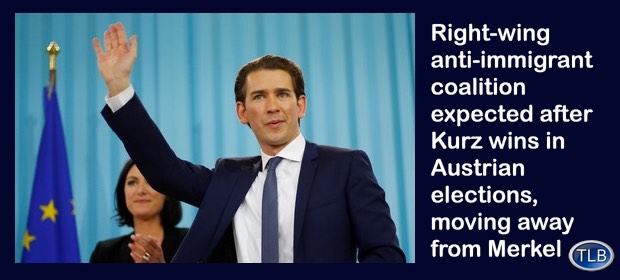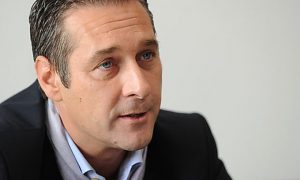
Meet The 31-Year-Old Austrian Anti-Immigrant Who Just Became The World’s Youngest Leader
As discussed earlier, Austria’s young conservative star, Sebastian Kurz, is now assured of becoming the country’s next leader, projections of Sunday’s parliamentary election result showed, but his party is far short of a majority and is likely to seek a coalition with the resurgent far right.
Sebastian Kurz arrives to cast his ballot on Oct. 15.
To his supporters, Kurz is Austria’s Macron: a one-man political phenomenon who is the only thing standing between the country’s resurgent nationalists and power. But to his detractors he is the Austrian Trump, who has hijacked one of the country’s two main parties and refashioned it in his own image. His critics say he is only holding the populists back by adopting their anti-immigrant rhetoric and policies.
By taking a hard line on immigration that commingled his campaign with that of the Freedom Party (FPO), 31-year old Foreign Minister Kurz managed to propel his People’s Party to first place and draw some support away from an FPO buoyed by Europe’s migration crisis. Both parties increased their share of the vote from the last parliamentary election in 2013, marking a sharp shift to the right. Chancellor Christian Kern’s Social Democrats were in a close race with the FPO for second place.
Kurz now has a mandate to form a coalition, replace Social Democrat Christian Kern as chancellor and become the world’s youngest government leader.
With the Freedom Party poised to return to government for the first time since 2005, congratulations poured in from European nationalists including France’s Marine Le Pen and Geert Wilders in the Netherlands, while the World Jewish Congress expressed concern. For German Chancellor Angela Merkel, the result may chip away at a key ally’s pro-European stance in the years ahead.
Frauke Petry, a former head of the anti-immigration Alternative for Germany party, which drew inspiration from its Austrian counterpart, posted congratulations on Twitter. Ronald Lauder, who heads the World Jewish Congress, said the Freedom Party is “full of xenophobes and racists. It is sad and distressing that such a platform should receive more than a quarter of the vote and become the country’s second party,” he said in an emailed statement. “My only hope is that they won’t end up in government.”
While Sunday’s projected result doesn’t guarantee a coalition with the Freedom Party, Kurz has a mandate to form a government after an early election he triggered by breaking up a coalition with the Social Democrats this year. The final tally may still be influenced by postal ballots, which will only be counted on Monday.
“This is a strong mandate for us to bring about change in this country,” Kurz told cheering supporters in Vienna as the results came in. “It’s about establishing a new political style, a new culture. It is our task to work with all others for our country,” Kurz told his supporters, without revealing which way he was leaning on coalition talks.
Austria, one of Europe’s wealthiest nations of 8.7 million people, whose capital Vienna is ranked every year among the top 3 cities in which to live, was a gateway into Germany for more than 1 million people during the migration crisis that began in 2015. Many of them were fleeing war and poverty in the Middle East and elsewhere. Austria also took in roughly 1 percent of its population in asylum seekers in 2015, one of the highest proportions on the continent. Many voters say the country was overrun.
Kurz’s strategy of focusing on that issue paid off.
 Meanwhile, the FPO was short of its record score of 26.9 percent, achieved in 1999, but still has a good chance of entering government for the first time in more than a decade. The OVP and the Social Democrats are at loggerheads, meaning the FPO is likely to be kingmaker. FPO leader Heinz-Christian Strache (pictured), who has accused Kurz of stealing his party’s ideas, declined to be drawn on his preferred partner.
Meanwhile, the FPO was short of its record score of 26.9 percent, achieved in 1999, but still has a good chance of entering government for the first time in more than a decade. The OVP and the Social Democrats are at loggerheads, meaning the FPO is likely to be kingmaker. FPO leader Heinz-Christian Strache (pictured), who has accused Kurz of stealing his party’s ideas, declined to be drawn on his preferred partner.
“Anything is possible,” he told ORF. “We are pleased with this great success and one thing is clear: nearly 60 percent of the Austrian population voted for the FPO program.”
“There won’t be a debate to leave the EU, but the Freedom Party is strong enough to demand significant concessions” and may lead Austria to align more often with eastern European countries that have challenged Merkel on issues including migration, said Thomas Hofer, a political consultant in Vienna. “Austria has mostly been an ally of Germany for decades, but that picture could change more often now,” Hofer said.
Austria’s two big parties, the People’s Party and the Social Democrats, have governed together for 44 of the 72 years since World War II. While Kurz and Freedom leader Heinz-Christian Strache might shake up Austria’s cozy political order, they broadly agree in pledging business-friendly policies, notably to scrap corporate taxes on retained profits. They’ll also stay in the German-led camp favoring fiscal austerity in the euro area.
* * *
So who is Kurz?
Kurz, dubbed both the “Conservative Macron” and “Austrian Trump” due to his age and his party reform, said: ‘I would of course like to form a stable government. If that cannot be done then there are other options,’ adding that he planned to talk to all parties in parliament but would first wait for a count of postal ballots that begins on Monday.
The young leader has pledged to cut benefits for all foreigners in Austria and has vowed to stop the European Union meddling in the country’s politics.
In his victory speech, he said: “I can only say, I am really overwhelmed. We campaigned for several months.”
“We built a massive movement. We had a goal to be the first ones over the (finish) line on October 15. We have made the impossible possible. Thank you for all your work and for this historic success. Today is not about triumphing over others. But today is the day for real change in our country. Today has given us a strong mandate to change this country, and I thank you for that. We were handed a great responsibility from the voters, and we should all be aware of it. We should also be aware that a lot of people have put their hopes into our movement. I can promise you that I will fight with all my strength and all my commitment for change in this country, and I want to invite you all to come along this path together with me.”
Kurz also wants to slash Austria’s red tape and keep the EU out of national affairs.
At 31, Kurz is young even by the standards of Europe’s recent youth movement, which saw Macron enter the Elysee Palace at the age of 39 and Christian Lindner, 38, lead Germany’s liberal Free Democrats (FDP) back into the Bundestag.
Kurz and Lindner showed that young new faces can inject dynamism into old establishment parties that have lost their way with voters. Kurz rebranded the OVP as the New People’s Party and changed its colours from black to turquoise. Lindner used trendy black-and-white campaign posters that showed him staring at his smartphone to revitalise the FDP’s image.
Macron, who formed his own political movement, was able to paint himself as a rebel outsider despite having served for four years under failed French Socialist Francois Hollande.
By taking a hard line on immigration that left little daylight between him and the far-right Freedom Party (FPO), 31-year-old Foreign Minister Kurz managed to propel his People’s Party to first place and draw some support away from an FPO buoyed by Europe’s migration crisis. Both parties increased their share of the vote from the last parliamentary election in 2013, marking a sharp shift to the right. Chancellor Christian Kern’s Social Democrats were in a close race with the FPO for second place.
Today Kurz was pictured voting in the Austrian capital Vienna alongside his girlfriend Susanne Thier – a finance ministry worker who he met at the age of 18.

Sebastian Kurz, 31, is set to take power and form an alliance with the far-right.
He is pictured today with his girlfriend Susanne Thier, a finance ministry worker
Without revealing which way he was leaning on coalition talks, the 31-year-old told his supporters: “It is our task to work with all others for our country.”
* * *
Earlier
The front runner in Austria’s Sunday election ended his campaign with a familiar message: Sebastian Kurz pledged to make Austria great again. He is set to become the world’s youngest leader, ahead of France’s Emmanuel Macron, who is 39… oh and North Korea’s 34-year-old Kim Jong-un, of course.
“I want to put Austria back on top,” he told an adoring crowd in Wiener Neustadt according to the Telegraph. “I want to provide security and order, because the Austrian people deserve it.”

Sebastian Kurz
Austrians are voting Sunday in the country’s National Council elections, where according to recent polls the country’s 6.4 million voters are likely to ditch the current coalition in favor of a new government backed by anti-immigration nationalists and headed by a 31-year-old Millennial.
Ahead of today’s election results, the conservative candidate of the Austrian People’s Party (OVP), 31-year-old Sebastian Kurz, is leading the polls with Social Democratic Party (SPO) and the right-wing anti-immigrant Freedom Party (FPO) battling to secure second place. Polls suggest Kurz will lead his conservative People’s Party to victory in Sunday’s election: a victory by the millennial could lead to the unwind of a decade of Social Democratic-led administrations “that revived the economy but struggled with issues over immigration and welfare” and result in the anti-immigrant Freedom Party becoming a part of the coalition government for the first time in history.
To his supporters, Kurz is Austria’s Macron: a one-man political phenomenon who is the only thing standing between the country’s resurgent nationalists and power. But to his detractors he is the Austrian Trump, who has hijacked one of the country’s two main parties and refashioned it in his own image. His critics say he is only holding the populists back by adopting their anti-immigrant rhetoric and policies.
After a surge of support for populist candidates in elections this year in the Netherlands, France and Germany, Austria looks like it will go one further and elect an anti-immigration alliance. The biggest winner will be the aspiring 31-year-old Kurz, who has been Austria’s Minister for Foreign Affairs and Integration since 2013, and who is leading his political campaign along the center-right principles which seem to exploit the refugee issue.

Sebastian Kurz, 31, Austria’s foreign minister and leader of the People’s Party,
greets supporters during his final campaign event in Vienna on Oct. 13
A recent survey by Meinungsraum conducted for GMX.at shows that FPO might secure around 28.5% of the vote, followed by OVP with 26.5%. SPO is expected to attract roughly 20% of the vote. Another poll by Research Affairs/Österreich predicts OVP to secure around 33% of the vote. FPO is predicted to come in second with around 27% , followed by SPO with 23% of the vote.
“People are worried about the future and that is the currency that matters in this election,” said Christoph Hofinger, head of the SORA polling institute in Vienna. “The debate is revolving around the issue of fairness, and a lot is also linked to migration.”
Back in May, Kurz called for a snap election amid tensions with coalition partner, the Social Democrats. The young politician previously backed plans to block refugee routes into Europe and supported a ban on full-face veils. He also supports cracking down on radical Islam, echoing FPO sentiments and luring in nationalist voters.
For the past two years, the issue of how to deal with the influx of migrants has been among the most sensitive in Austrian society. The swell of anxiety over immigration to Austria began building 2015, when almost 70,000 mostly-Muslim refugees sought asylum from war-torn countries such as Syria, Afghanistan and Iraq. Schools and hospitals in the nation of 8.7 million struggled to accommodate the newcomers, and disagreements over whether it was fair to give immigrants generous welfare support dominate the media.
As a result, voters have gravitated toward promises by both the People’s Party and Freedom to limit the number of immigrants Austria receives and force newcomers to adapt local customs more quickly.
Leading FPO candidate Heinz-Christian Strache gained massive support ahead of the election by focusing on the country’s immigration policies and on issues such as unemployment, minimum wage and pensions. The party, founded by a former Nazi SS member after the end of the World War II, stuck the nerve of the electorate by proposing to stop immigration and by speaking out against Islam. The FPO support grew to unprecedented levels following EU-wide ‘Open Door’ migrant policy championed by Germany in wake of 2015 refugee crisis.
While the biggest number of migrants was welcomed by Berlin, Austria received nearly 150,000 asylum requests since 2015. Comprising just over 1 percent of the population, their presence in the country became the number one debated issue in the election.
Meanwhile, the incumbent chancellor of Austria and chairman of the Social Democratic Party, Christian Kern, is virtually assured to lose his place as the head of the government. Unlike his rivals, Kern advocates a much softer stand on migration, instead placing emphasis on employment and the economy. Kern, 51, a former business executive plucked from the national railroad by the Social Democrats in May 2016, has been dogged by sloppy campaign management. Despite overseeing faster growth in the export-oriented economy, Kern has struggled to connect with voters. His No. 1 goal is achieving full employment, since “modernizing the country with investment in education, security, health care and pensions” depends on it, Kern said late Thursday in the campaign’s final debate.
“Austria deserves someone who is ready to take on real responsibility for the population,” Strache said in a parliamentary speech this week, in which he chided Kern for letting thousands of refugees enter Austria, transported on the national railroad he ran before becoming chancellor.
Regardless of performance in Sunday’s election, the three main parties must work together to form a new coalition government. Neither the OVP nor the SPO has ruled out a coalition with the FPO, which may play the role of the kingmaker at the end of the day since as the revival of OVP/ SPO coalition seems unlikely. Other parties such as the liberal NEOS (The New Austria and Liberal Forum) and the Greens are expected to secure single digits.
Compared with 10 years ago, more Austrians say they feel like they’re not being heard and are in search of law-and-order leadership, a SORA institute study showed. More than two-fifths of voters declared their desire for a “strongman” leader, according to the research, periodically commissioned by the federal government to gauge public attitudes and consciousness about the country’s Nazi history.
Step forward Kurz, the foreign minister who’s distanced himself from the People’s Party’s leadership and forged similar views with Freedom’s Strache on immigration. Both men want to restrict immigrant access to Austria’s social-security system and impose tighter policing on the country’s borders. The Freedom Party came within 30,000 votes of winning the presidency, a mostly ceremonial post, in a run-off vote last year.
In Austria, anyone over the age of 16 is eligible to vote in roughly 13,000 voting locations throughout the Alpine nation. There are about 6.4 million voters, and those who cast their ballots will decide 183 contested seats at the National Council.
************
Original article
ER recommends other articles by Zerohedge








